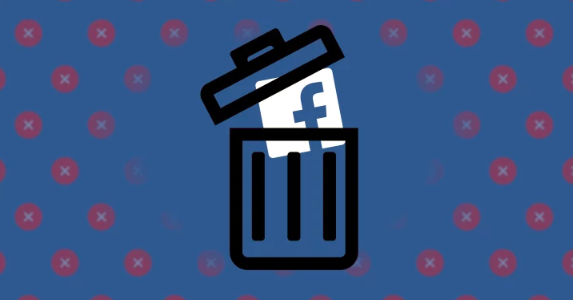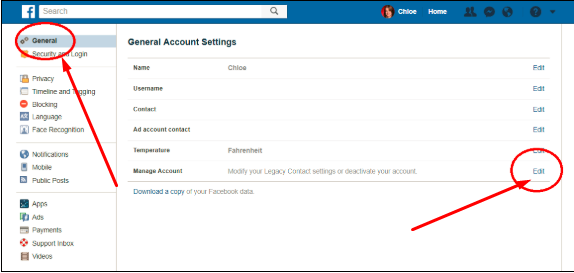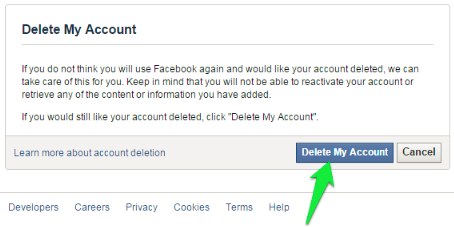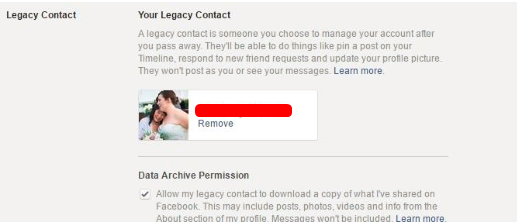How to Delete Facebook Account Step by Step
By
Arif Rahman
—
Sep 19, 2018
—
Deleting Facebook Account
Current events might have you pondering a break from Facebook. That's not a choice for everyone; in that case, simply tighten up your account settings. How To Delete Facebook Account Step By Step: However if having your data extracted for political functions without your consent illustrations you out, there are methods to separate on your own from the large social media.

If you're ready for a social media break, right here's the best ways to delete Facebook.
Deactivating
Facebook offers you 2 choices: 2 alternatives: deactivate or remove
The very first couldn't be much easier. On the desktop computer, click the drop-down menu at the top-right of your screen and pick settings. Click General on the top left, Edit next to "Manage Account" Scroll down as well as you'll see a "Deactivate My Account" link at the bottom. (Below's the direct link to utilize while visited.).
If you get on your smart phone, such as making use of Facebook for iOS, similarly most likely to settings > Account settings > General > Manage Account > Deactivate.

Facebook does not take this lightly - it'll do whatever it can to keep you around, consisting of psychological blackmail concerning how much your friends will miss you.
Because of this, "Deactivation" is not the same as leaving Facebook. Yes, your timeline will vanish, you will not have accessibility to the site or your account via mobile applications, friends can not post or contact you, and also you'll shed access to all those third-party solutions that use (or need) Facebook for login. But Facebook does not remove the account. Why? So you could reactivate it later on.
Just if expected re-activation isn't in your future, you ought to download a copy of all your data on Facebook - posts, photos, videos, talks, and so on-- from the settings menu (under "General"). Exactly what you discover may shock you, as our Neil Rubenking figured out.
Account Deletion

To totally remove your Facebook account forever and ever, most likely to the Remove My Account web page at https://www.facebook.com/help/delete_account. Just know that, per the Facebook data use policy "after you remove information from your profile or delete your account, copies of that information could continue to be viewable in other places to the level it has been shown to others, it was otherwise dispersed pursuant to your personal privacy settings, or it was duplicated or saved by other individuals.".
Translation: if you wrote a talk about a good friend's condition upgrade or picture, it will stay even after you delete your own profile. A few of your posts as well as images might spend time for as long as 90 days after removal, too, though simply on Facebook web servers, not reside on the site.
Removal on Behalf of Others
If you want to alert Facebook regarding a customer you understand is under 13, you can report the account, you narc. If Facebook could "reasonably validate" the account is made use of by a person underage-- Facebook outlaws children under 13 to comply with federal legislation-- it will delete the account immediately, without notifying anybody.
There's a different form to demand removal of represent people who are medically incapacitated and also therefore incapable to make use of Facebook. For this to work, the requester has to confirm they are the guardian of the person in question (such as by power of attorney) in addition to offer an official note from a medical professional or medical center that define the incapacitation. Redact any info essential to keep some privacy, such as clinical account numbers, addresses, etc.
If an individual has died, a tradition get in touch with-- a Facebook pal or relative that was assigned by the account owner before they died-- can obtain access to that person's timeline, when approved by Facebook. The tradition contact could should offer a connect to an obituary or other documents such as a fatality certification. Facebook will "memorialize" the web page so the dead timeline lives on (under control of the legacy contact, who can't post as you), or if liked, remove it.

Assign a certain tradition get in touch with person to manage your account after your death. You can discover that under settings > General > Manage Account > Your Legacy Contact. When you established one up, you'll obtain a notification each year from Facebook to double check that the call need to stay the exact same, unless you opt out of that. You can also take the added step of seeing to it that after you pass away, if the tradition call does report you to Facebook as dead, your account obtains deleted (even if the tradition call wants the timeline to be memorialized).

If you're ready for a social media break, right here's the best ways to delete Facebook.
How To Delete Facebook Account Step By Step
Deactivating
Facebook offers you 2 choices: 2 alternatives: deactivate or remove
The very first couldn't be much easier. On the desktop computer, click the drop-down menu at the top-right of your screen and pick settings. Click General on the top left, Edit next to "Manage Account" Scroll down as well as you'll see a "Deactivate My Account" link at the bottom. (Below's the direct link to utilize while visited.).
If you get on your smart phone, such as making use of Facebook for iOS, similarly most likely to settings > Account settings > General > Manage Account > Deactivate.

Facebook does not take this lightly - it'll do whatever it can to keep you around, consisting of psychological blackmail concerning how much your friends will miss you.
Because of this, "Deactivation" is not the same as leaving Facebook. Yes, your timeline will vanish, you will not have accessibility to the site or your account via mobile applications, friends can not post or contact you, and also you'll shed access to all those third-party solutions that use (or need) Facebook for login. But Facebook does not remove the account. Why? So you could reactivate it later on.
Just if expected re-activation isn't in your future, you ought to download a copy of all your data on Facebook - posts, photos, videos, talks, and so on-- from the settings menu (under "General"). Exactly what you discover may shock you, as our Neil Rubenking figured out.
Account Deletion

To totally remove your Facebook account forever and ever, most likely to the Remove My Account web page at https://www.facebook.com/help/delete_account. Just know that, per the Facebook data use policy "after you remove information from your profile or delete your account, copies of that information could continue to be viewable in other places to the level it has been shown to others, it was otherwise dispersed pursuant to your personal privacy settings, or it was duplicated or saved by other individuals.".
Translation: if you wrote a talk about a good friend's condition upgrade or picture, it will stay even after you delete your own profile. A few of your posts as well as images might spend time for as long as 90 days after removal, too, though simply on Facebook web servers, not reside on the site.
Removal on Behalf of Others
If you want to alert Facebook regarding a customer you understand is under 13, you can report the account, you narc. If Facebook could "reasonably validate" the account is made use of by a person underage-- Facebook outlaws children under 13 to comply with federal legislation-- it will delete the account immediately, without notifying anybody.
There's a different form to demand removal of represent people who are medically incapacitated and also therefore incapable to make use of Facebook. For this to work, the requester has to confirm they are the guardian of the person in question (such as by power of attorney) in addition to offer an official note from a medical professional or medical center that define the incapacitation. Redact any info essential to keep some privacy, such as clinical account numbers, addresses, etc.
If an individual has died, a tradition get in touch with-- a Facebook pal or relative that was assigned by the account owner before they died-- can obtain access to that person's timeline, when approved by Facebook. The tradition contact could should offer a connect to an obituary or other documents such as a fatality certification. Facebook will "memorialize" the web page so the dead timeline lives on (under control of the legacy contact, who can't post as you), or if liked, remove it.

Assign a certain tradition get in touch with person to manage your account after your death. You can discover that under settings > General > Manage Account > Your Legacy Contact. When you established one up, you'll obtain a notification each year from Facebook to double check that the call need to stay the exact same, unless you opt out of that. You can also take the added step of seeing to it that after you pass away, if the tradition call does report you to Facebook as dead, your account obtains deleted (even if the tradition call wants the timeline to be memorialized).




